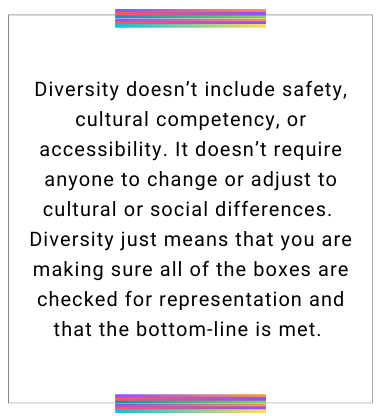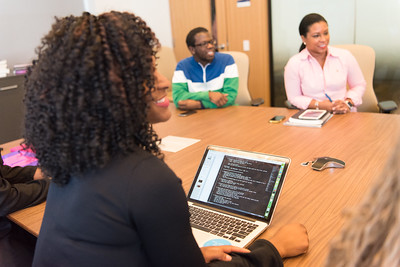Rethinking Diversity: Prioritizing Access, Equity, and Belonging in the Workplace
Published by: WCET | 2/29/2024
Tags: Diversity/Equity/Inclusion, Professional Development, Technology, Workforce/Employment
Published by: WCET | 2/29/2024
Tags: Diversity/Equity/Inclusion, Professional Development, Technology, Workforce/Employment

Today’s workplaces are ever evolving, and one of the best consequences of that is the pursuit of equity and access. It is imperative that we not only foster inclusive environments but actively celebrate such workplaces that embrace diversity and recognize those individuals working to advance inclusive initiatives.
In today’s post, guest author Sabrina Short, Founder and CEO of NOLAvate Black discusses the power of the inclusive workplace and explores practical strategies and ways to empower those in the environment to truly embrace and support equity in the workplace. Thank you to Sabrina for sharing about this outstanding organization and challenging us to rethink about workplace diversity in a new light.
Enjoy the read,
Lindsey Downs, WCET
I have been very fortunate in my life to be surrounded by people who believed in me, poured their time and affection into me, and supported the progression of my career. Navigating your career can be tough, especially when you feel like you are the only one who looks like you. Early on in my professional journey, I worked for corporate and large organizations. In these roles, I was often the youngest and often the only or one of very few Black people on the team. However, there were those, specifically Black women, in my life who believed in me and opened many doors that helped me get to where I am today. While having mentors who share your background provides validation and safety, cultivating relationships with individuals from diverse backgrounds also brings invaluable perspectives, networks, and opportunities that promote professional advancement.
I am the founder and CEO of NOLAvate Black, a global tech exchange that focuses on bringing resources, funding, expertise, and innovation to our local technology and creative economy.
We started as a conference focused on addressing systematic racism and injustice that prevents Black people and under-resource communities from gaining access to higher demand and higher wage jobs in the technology section. A major part of my work is fostering spaces that are inclusive and accessible, and inciting leaders in the technology workspace to think differently about how they engage underrepresented talent. When building culturally inclusive teams, allies are instrumental in removing barriers, providing access to opportunities, and offering perspective for uncharted spaces. Embracing both representation and diversity in our support networks builds a sustainable organization that can thrive in a multicultural and interconnected world.
I often challenge people when they talk about diversity because diversity is just adding someone to an organization or community. Diversity doesn’t include safety, cultural competency, or accessibility. It doesn’t require anyone to change or adjust to cultural or social differences. Diversity just means that you are making sure all of the boxes are checked for representation and that the bottom-line is met.
When I talk about building sustainable and inclusive workspaces and professional communities, I use terminology such as access, equity, and belonging.
When we invite people to such environments, we must shift our perspectives to a “culture add” or “culture aligned” approach, which suggests that we are looking to build an organization and space that values the whole individual and welcome their contributions to the organization’s growth.


Of course, leaders should view building their communities with a bottom-line and numerical approach. However, building an inclusive culture encompasses much more than ROI; it involves relational advocacy. Relational advocacy focuses on creating spaces where everyone, regardless of background or identity, feels valued, respected, and empowered by being an ally, mentor, or sponsor for underrepresented professionals. Anyone can be an advocate. Beyond just race and ethnicity, advocacy spans across socioeconomic, gender, language, or even physical and cognitive differences.
While all three roles—ally, sponsor, and mentor—can contribute to diversity and access in the workplace and professional circles, they have distinct functions and responsibilities:
An ally is someone who supports individuals from marginalized groups, and works to challenge discrimination, bias, and systemic barriers for underrepresented people. Allies often focus on creating a more inclusive environment and raising awareness about issues related to diversity and equity.
Mentors are experienced individuals who provide guidance, advice, and support to a less experienced individual to help them develop personally and professionally. Mentors offer wisdom, perspective, and expertise based on their own career experiences and knowledge. While mentors may also advocate for their mentees’ career advancement, their primary role is to provide guidance, coaching, and developmental opportunities.
A sponsor is a senior-level individual within an organization who actively champions and advocates for the career advancement of an early career professional. Sponsors use their influence, networks, and power within the organization to create opportunities for others. Sponsors are typically more directly involved by providing visibility to decision-makers and advocating for advancement.
When deciding to be an advocate, each person must decide if they have the time, resources and commitment to invest in someone, break barriers that they can’t achieve on their own. No matter what pathway you choose as an advocate, be intentional to actively foster a space where power is transferred, barriers are removed toward access to opportunity, and where there is a redistribution of influence and resources to foster greater equity and inclusion.
Advocacy, in its most profound sense, goes beyond tokenistic gestures and surface-level performative actions to address systemic inequities that have existed for generations. It is crucial to recognize that with the right mentorship and access to resources, everyone has the potential to be successful.
No matter your background, whether as an ally, sponsor, and/or a mentor, we all must work together to amplify the voices of marginalized individuals and ensure that everyone is empowered and valued within our organizations.
I am personally a living example of what can happen when someone sees the potential in an individual and invests in their future. Maya Angelou said, “I’ve learned that people will forget what you said, people will forget what you did, but people will never forget how you made them feel.” Let’s honor these words by choosing to be leaders who act as allies, mentors, and sponsors in our communities, ensuring everyone feels that their dreams are valued and that the possibilities are endless.
For 6 years, NOLAvate Black has helped hundreds of Black and Brown people advance in tech – from entry to exit. Year-round we host events, facilitate workshops, and find ways to make the technology sector more accessible. Even today, with numerous ecosystem building organizations and intermediaries focused on tech equity, Black and Brown people still only make up a small percentage of talent in the sector and Black founders make up less than 1% of VC funding.

Our work is not easy work, as diversity isn’t a priority for many organizations, but it is so worthwhile when I hear “thank you NOLAvate Black, because you changed my life.”
Helping people find jobs, fostering communities of culture, helping businesses secure funding, and supporting companies as they build inclusive teams – not only changes lives, it changes our communities.
Founder & CEO, NOLAvate Black